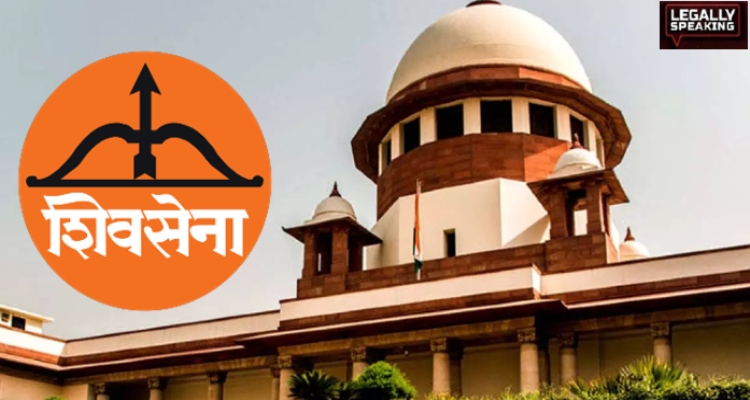
The Supreme Court has questioned the utilization of the legislative majority test by Maharashtra Legislative Assembly Speaker Rahul Narwekar while determining that Chief Minister Eknath Shinde-led faction was the genuine Shiv Sena, and has summoned the original records regarding the disqualification row from the speaker’s office.
Hearing a plea of the Uddhav Thackeray faction against the speaker’s order declaring the Shinde bloc as the “real political party” after the split in the Shiv Sena in June 2022, the apex court has also taken note of the claim of senior advocate Harish Salve, representing the group led by the chief minister, regarding “forgery” in some relevant documents.
The original records will be summoned from the office of the adjudicating authority (speaker), said the bench comprising Chief Justice D Y Chandrachud and Justices JB Pardiwala and Manoj Misra, and scheduled the Thackeray faction’s plea for hearing on April 8. The bench mentioned it was leaving open the issue of the maintainability of the petition of the Thackeray faction.
The top court, which had issued notice on the Thackeray group’s petition on January 22, directed Shinde and his MLAs to file a response positively on or before April 1. The speaker had, in an order on January 10, declared the Shiv Sena bloc led by Shinde as the “real political party” after the split in June 2022. He had also dismissed the Thackeray faction’s plea to disqualify 16 MLAs of the ruling camp, including Shinde.
The bench acknowledged the submissions of senior advocate Abhishek Singhvi, appearing for the Thackeray group, that there was a distinction between legislative majority and organizational majority post defection. The senior lawyer referenced a judgment which held that legislative majority post defection would not necessarily signify real majority. Questioning the use of the test of legislative majority to ascertain which faction was the real party, the CJI referred to the order of the speaker and queried, “Is this not contrary to the judgment? The whole submission is contrary to the judgment of our court.”
Salve opposed the Thackeray group’s petition and suggested that the Bombay High Court be allowed to adjudicate the issue as the Shinde faction has moved there challenging a part of the speaker’s order which declined to disqualify certain MLAs of the Thackeray faction. Senior advocate Mukul Rohatgi, also representing the Shinde faction, referred to a recent judgment and recommended that the high court be permitted to hear and decide it.
Initially, senior advocate Kapil Sibal, who along with Singhvi appeared for the Thackeray group, highlighted that time was crucial in the matter as the term of the assembly was expiring in October, and therefore, remanding the case to the high court would render the whole issue futile. Salve questioned the authenticity of some documents and pointed to the resolution of June 2022 by which Shinde was removed as the leader of the Shiv Sena legislature party. He asserted that the documents produced by the Thackeray group were fabricated and highlighted alleged discrepancies in the resolution.
This led the bench to order the summoning of records from the office of the speaker. The court mentioned it would hear the final arguments on April 8 and decide the issues, including the maintainability of the plea of the Thackeray faction. On January 22, the top court had sought responses from the chief minister and other lawmakers of his group on the plea.
The Thackeray faction, in its petition filed through MLA Sunil Prabhu, has alleged that Shinde “unconstitutionally usurped power” and is heading an “unconstitutional government”. Challenging the orders passed by the speaker, the Thackeray faction has claimed they are “patently unlawful and perverse” and that instead of penalizing the act of defection, they reward the defectors by holding that they comprise the real political party. “All impugned decisions are premised on a common finding that the majority of legislators represented the will of the political party, and therefore, they are not liable for disqualification,” the plea said. This amounts to a complete inversion of the 10th Schedule, which is intended to disqualify legislators who act against their political party, it said.
In his ruling on the disqualification petitions, the speaker did not disqualify any MLA belonging to the rival camps. The Shinde group had the support of 37 out of the total 54 Sena MLAs when the party split in June 2022, the speaker had noted. The Election Commission had given the ‘Shiv Sena’ name and ‘bow and arrow’ symbol to the Shinde-led faction in early 2023.
In his order on the disqualification petitions filed by the Shinde-led Sena and the rival Thackeray faction against each other’s MLAs, Narwekar had said Sunil Prabhu of the Sena (UBT) ceased to be the whip from June 21, 2022 (when the party split) and legislator Bharat Gogawale of the Shinde group became the authorized whip. The speaker had also held that the Shiv Sena ‘pramukh’ (chief) did not have the power to remove any leader from the party. He did not accept the argument that the will of the party chief and the will of the party were synonymous.




